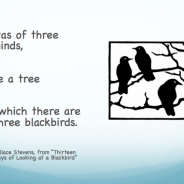Posted by Diane Morrow on January 30, 2007 in A Different Perspective
In 2003, James Pennebaker and R.S. Campbell published an article that carried the intriguing title, “The Secret Life of Pronouns”. The authors proposed, based on the analysis of thousands of texts, that flexibility in a person’s use of pronouns when writing about painful memories is associated with improved health. This was not a predicted finding. It emerged when Pennebaker and associates persisted in asking the question: Why it is that writing about emotional topics results in better physical health? What actually happens? The most consistent finding prior to this 2003 study had been that people who participated in expressive writing reported that, afterwards, they actually thought differently about the experiences after they wrote about them. Pennebaker’s question then became: “Is this change in thinking reflected in the ways people write?” In other words, do people become healthier as their writing changes in some way? To try and answer this question Pennebaker used a computer program developed by researchers on artificial intelligence, a program which performs linguistic analysis on written texts. 7501 writing samples were examined. A total of 3,445,940 words. A virtual sea of words. In this sea, he looked at how a person’s writing changed over successive days—and whether or not these changes were correlated with better health. The first thing Pennebaker looked at was content. Did changing the content of one’s writing over a period of days affect health? For instance, did the health of those persons who wrote about a different topic on successive days fare better than the health of those who wrote about the same topics? The answer? It appeared to make no difference. Next, Pennebaker looked at writing style. And he discovered that when people changed their writing styles over several days they were more likely to show improvements in health. When he narrowed down these changes in style, he discovered that participants were most likely to show improvement in health if, over the course of different writing samples, they changed what pronouns they used. It’s an intriguing finding. For instance, writing from the I point of view some of the time, and then you, then we, then he or she or they correlated with better health. The finding was not a directional finding. It was not better, for instance, to move from first person to third person, or visa versa. What mattered was the simple fact of variability—flexibility. In his remarks about the study, Pennebaker makes this comment: “Pronoun choice is based on perspective.” He also admits that the finding is enigmatic. It raises more questions than it answers. For instance, does pronoun flexibility actually cause improved health, or is it a feature that merely emerges coincident with improved health? Is pronoun flexibility a skill that can be learned? Could it be like yoga? Flexibility increasing with practice? Or, to put this yet another way: is there any benefit to be gained from intentionally writing from a different point of view? Is shifting one’s point of view a potentially healing...
read more

